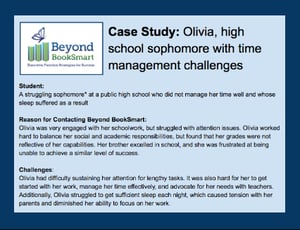We all know the typical trajectory. It’s what most of your friends are doing: graduating high school,  enjoying summer, and moving directly on to college.
enjoying summer, and moving directly on to college.
But that’s not the path for you. Some of your peers know exactly what they want to be and others are just going to college because it’s the next step... and that’s fine for them. But it’s not who you are. You need some time to get out of the school grind and to reflect before jumping into another grueling four-year scholastic experience.
So you find yourself staring at a gap year and wondering to yourself: How can I make good use of this time? What can I do to make sure that I’m not in the same uncertain, up-in-the-air place next year?
Well, gap years are really useful for two purposes: finding yourself and optimizing yourself. But both of these things take some intentional work - they don’t just happen automatically.
Finding Yourself During Your Gap Year
This, really, is the primary purpose for this gap year. Maybe you just needed a break from the relentless waves of homework and tests, but really the reason that was so tough was that you didn’t know what it was for. It was just something else to get through. Now, though, you’re looking into a future in which you can make mindful decisions about what you want your short-term and long-term goals to be. The only problem is … how do you find that out?
Tactic #1: Journaling
Ok, I know this might seem like another writing assignment (you got out of school to get away from this stuff) but it’s not. This is writing for an audience of just yourself. This is where you try out these hesitant thoughts and ideas, imagine different possible futures, and argue with yourself about the best ways to go. Yes, I know, you’ve been doing that in your head this whole time - but there’s something different about doing it on paper (or on a screen). In your head, the internal struggles can get too noisy or disorganized, until your brain just thinks “Ah, just forget about it and watch the next episode of Stranger Things.” That’s fine once in a while, but it’s easy to get caught in a habit of avoiding your difficult thoughts. Setting aside a finite amount of time to journal regularly helps you to slow down and to categorize your discordant mental threads, to see how they evolve over time, to see what themes you keep coming back to, and to help you observe your own thinking in a way that you can’t when it all remains trapped in your head.
Tactic #2: Trying new things
Yes, this might seem like fortune-cookie advice, but it’s become a cliché because it’s true. Trying new things is (sometimes) scary, but it’s one of the best ways to learn about yourself. Maybe you try skydiving, and learn something about how you handle (or don’t handle) fear and risk. Maybe you try volunteering, and learn how much you like (or don’t like) helping people. Maybe you join a club, and learn how much you like (or don’t like) being part of a community. The point is: As a different cliché puts it: Don’t knock it until you’ve tried it. (And then, once you’ve tried it and learned something about yourself, knock it all you want.)
Tactic #3: Talking to a potential future you
The psychologist Daniel Gilbert has argued (in his book Stumbling on Happiness) that one of the best ways to determine whether or not you’ll be happy in a potential future is to talk to a person who is living that future now. That means that you don’t have to just sit and imagine what it would be like being a lawyer - you can talk to someone who is practicing law now. Ask that person what excites them about their profession, what frustrates them, what sorts of personality traits or values they see as necessary to succeed in that field. As you do so, consider their behavior and demeanor when talking about their work, and think: Could I see myself doing this? Would I enjoy it more than some other career?
Optimizing Yourself - For After Your Gap Year
So far, we’ve been focusing on the primary goal of the gap year: to identify the best next step for you. But there are other valuable learning opportunities that you can capitalize on during this time. In fact, many of these skills are ones that college freshmen wish they’d developed before having a more-challenging-than-expected first year at college. Let’s take a look at how you can optimize yourself during your gap year.
Skill #1: Task Management - Breaking down large tasks into manageable chunks
Without the routine of school, after-school activities, and mom’s reminders to do your homework, most of what you’ll do during your gap year will require you to make it happen. As we noted above, you might, for instance, talk to someone who’s in a career you might be interested in. But to get the ball rolling on this takes a lot of prep work. You need to make a list of potential careers. You need to research some local people in those fields. You need to make contact with them. You need to do on-site visits. To make all of this happen, you might set weekly targets (contact five people this week) and monthly goals (shadow three people at work). By breaking down this task into target parts, you’ll learn how to tackle large projects on your own - a key skill to develop regardless of whether you enter right into the workforce or return to school.
Skill #2: Planning - Becoming a Google Calendar guru
The freedom of a gap year is thrilling, but it takes some significant management. In school, your schedule was set for you, but now you’ll need to find a way to be your own administrative assistant. As you begin this large project of figuring out what the heck to do with the rest of your life, you’ll quickly find that balancing writing in your journal and meeting with professionals with doing laundry, grocery shopping, cleaning the house, exercising, and walking the dog doesn’t just … happen. You’ll need a system. Fortunately for you, modern tools like Google Calendar make juggling lists of tasks like this easier than it might have been in yesteryear. Try out Google Calendar -- or find a different appointment-keeping system you like -- and then commit to mastering it and making it part of your routine. Before long, you’ll be wondering how you lived without it.
Skill #3: Emotional Regulation - Using tools to tame your brain
While the idea of “finding yourself” during the gap year sounds lovely, it doesn’t mean it will be a stress-free 365 days. Living full-time with your parents (rather than escaping from them while you’re at school all day), hearing from friends who are at college and are loving it, and managing the pressure of productively using your time to figure out the next steps can cause some emotional upheaval. So, rather than arguing with mom about doing the dishes after dinner or barking at Uncle Rick who just doesn’t get what a “gap year” even is, you’ll need to actively work on keeping cool during tense situations. Trying out a few different apps, such as calm.com and headspace, can help you identify the kinds of strategies that are best suited to you and can be effectively applied in future challenging situations.
While a gap year might involve a little relaxation - and possibly some trepidation about what’s next - the time it affords you for finding yourself and optimizing yourself can be invaluable. The key, though, is to actively work on both of these during your time away from academics, rather than seeing your gap year get lost to the siren calls of Netflix, Instagram, or Reddit.
Photo by Fancycrave on Unsplash
Please see this page for comprehensive information about Executive Function in high school students.
 Do you know a high school student who could benefit from learning more effective work habits before they start college? Read our case study about Olivia, a high school sophomore with attention challenges that interfered with her productivity and led to late nights and poor sleep. Find out how Olivia's coach helped her be ready for the demands of college.
Do you know a high school student who could benefit from learning more effective work habits before they start college? Read our case study about Olivia, a high school sophomore with attention challenges that interfered with her productivity and led to late nights and poor sleep. Find out how Olivia's coach helped her be ready for the demands of college.

